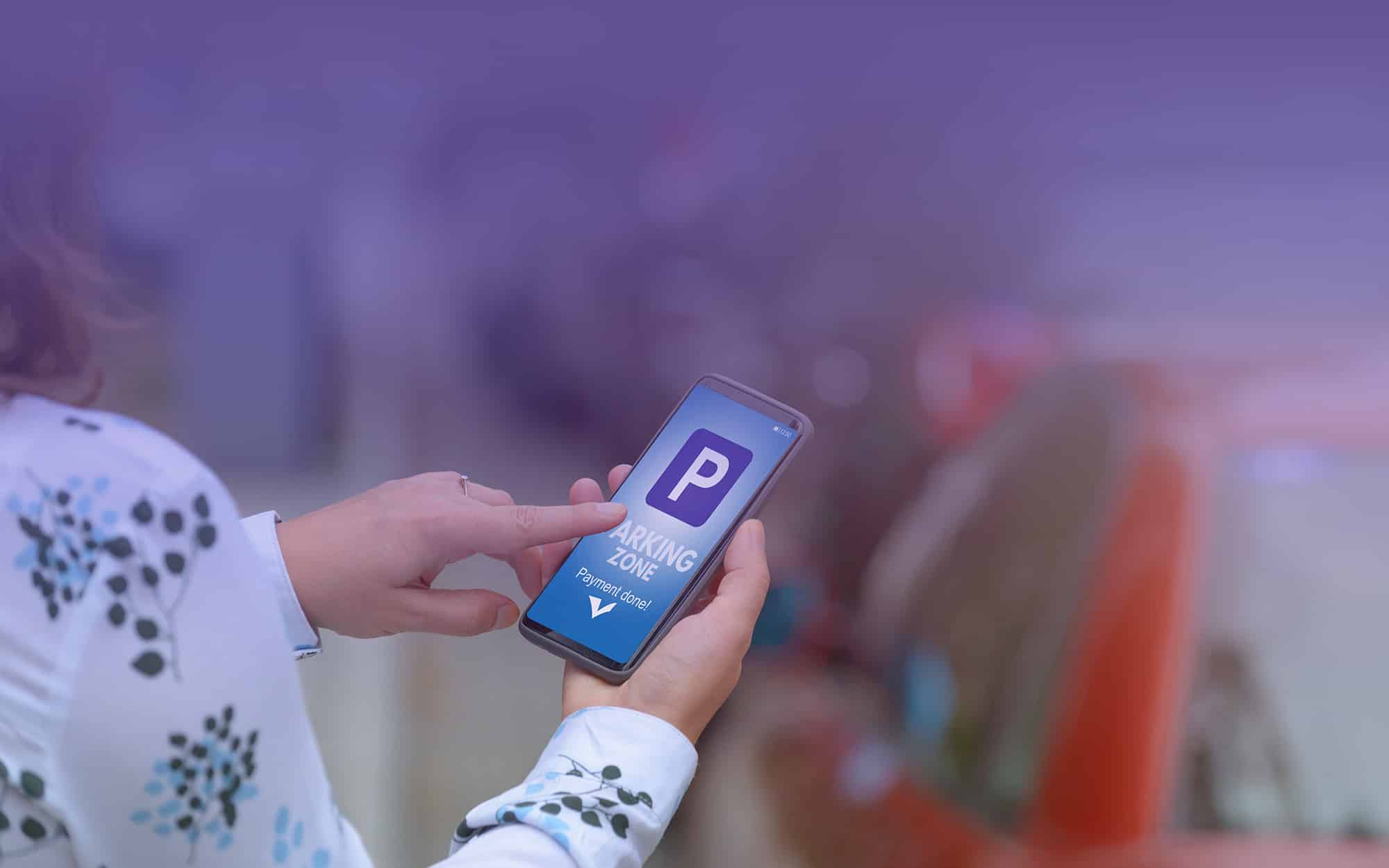
A Glimpse of the Future
From the Editor Melissa Rysak, editorrysak@parking-mobility.orgAt the IPMI Leadership Summit
Share:
Share:
The U.S. Department of Transportation’s Strengthening Mobility and Revolutionizing Transportation (SMART) Grants Program has emerged as a catalyst for innovation in urban mobility and transportation efficiency. With a focus on implementing advanced smart technologies, the $100 million per year initiative is running from 2022 through 2026 and is dedicated to reshaping how communities across the United States approach parking, mobility, and curb management. The SMART Grant Program has, and will continue to be, a driving force behind transformative initiatives in the U.S. for many years to come.
The goal of the program is to help cities that may not otherwise have the resources to fund such projects with the opportunity to identify transportation improvement projects that will enhance their communities well into the future. Some of these projects may have otherwise taken years to finance and complete, and many may never have been able to happen at all.
Eligible applicants include states, tribes, transit agencies, public toll authorities, and metropolitan planning organizations. The program funds innovations aimed at improving the data and technology capacity for government entities and utilizing newly available technologies for the benefit of the organizations and their communities.
Many of the projects already selected through the SMART Grants program are being facilitated by innovative technology providers throughout the parking and mobility industry. In 2022, 59 projects across 33 states received $94 million. These projects were selected from a total of 392 application submissions to the 2022 SMART Grants Program. The average amount of funding was just over $1.5 million, with selected projects implementing a wide range of technologies. As this is an annual initiative, the 2023 applications were due this past fall, and the DOT will open applications for the 2024 program soon.
The Federal SMART Grant Program is heavily influencing smart parking, mobility, and curb management initiatives across the U.S. As an industry, there are many opportunities for solution-providers to work with their municipal clients to identify smart technology systems that will provide the data needed to identify inefficiencies in their operation, evaluate opportunities for improvement, and implement solutions to increase revenues, streamline operations and staffing, and enhance the transportation and parking experiences within their communities.
As parking, transportation, and mobility professionals we are faced with an incredible opportunity to utilize the SMART Grant Program to not only support our government entity partners, but to completely reshape the fabric of communities across the country. The program will facilitate initiatives to support future urban development while encouraging solutions that promote cleaner air, reduced traffic congestion, improved safety, effectively utilization of data, development and implementation of effective policies, and more.
While we will look forward to seeing how these funds are utilized in diverse ways in the coming years, a recent project implemented across the pond in Cologne, Germany, serves as a perfect model for thought leadership, integration of innovative solutions, and successful results that have transformed the way people interact with the curb. Like many cities, Cologne is faced with the challenge of high CO2 emissions which regularly exceed EU norms. Up to 52% were caused by inner-city traffic, and as several studies have shown, the search for parking contributes significantly to congestion — often up to as much as 30%. As part of the Smart City Cologne project, the city has set a goal of reducing emissions by 50% by 2030. Therefore, it was vital that they identify answers to this problem, with a specific emphasis on the role played by the search for parking and the resulting traffic congestion.
The city identified a significant parking and curb management issue in one of its most active districts, Nippes. Cologne-Nippes is one of the busiest and most densely populated districts in the city. The area features a variety of shops, a daily market, schools, and residences. Despite having approximately 800 on-street parking spaces throughout the district, many struggled to locate parking near their destination, resulting in the typical driver circling for an extended time searching for a space. This of course led to traffic congestion, increased emissions, and an overall unpleasant parking and transportation experience for all.
Unfortunately, the city did not have any reliable historical and live data to refer to, and administrators were unable to get a comprehensive picture of the parking situation in Nippes. This required them to start from the ground up, identifying possibilities to gather this data and provide the information needed to implement more effective parking strategies. The city sought to optimize the use of the existing parking assets in the area while implementing a more efficient traffic management system to significantly reduce the time spent searching for parking.
By fostering collaboration with innovative solution providers, cities can utilize real-time data to identify inefficiencies, implement effective policies, and enhance the overall transportation and parking experiences within their communities.
To resolve these challenges, the city partnered with RheinEnergie AG, a regional energy supply company based there and one of the largest energy providers in Germany. The two organizations worked together to implement a smart parking solution. The result was a combination of sensors, LED displays, and a connected mobile app to provide real-time, turn-by-turn guidance. The comprehensive system allows drivers to find a parking space in less time and be on their way to their destination.
Another important goal of the project was to minimize disturbances to the neighborhood. The city was hesitant to approve digging or disturbances to the streets or sidewalks, and preferred a solution that could utilize existing infrastructure like lampposts and signage. In addition, civic authorities and parking operators required an end-to-end platform to minimize internal administrative efforts, while obtaining comprehensive parking data including occupancy rates, peak times, and peak areas.
The project resulted in the installation of 89 sensors throughout the community. The sensors were affixed to existing lampposts, avoiding construction disruptions, and facilitating a fast and easy implementation. The sensors can each cover up to 100 parking spaces, depending on mounting height, and parking space layout. They can also measure the exact GPS position and size of open parking spaces.
For Cologne-Nippes, the sensors provide accurate, real-time information regarding the number, location, and direction of available parking spaces based on AI and deep learning algorithms. The information is then relayed to LED parking guidance displays located at each relevant intersection, guiding drivers to the most convenient parking spaces. The City and RheinEnergie worked together to locate the LED displays effectively considering their geographical layout. Real-time parking availability information can also be viewed in a free mobile application available to all drivers and providing them with additional information about occupancy per parking space category (e.g. disabled or delivery), guidance, and links to payment services.
Finally, a smart parking dashboard allows RheinEnergie to monitor actual occupancy status per parking space, the duration of parking events, the technical status of each device, and the real-time view of each parking guidance display. Through this dashboard, stakeholders can extract and analyze essential data to utilize as the basis for future infrastructure decisions.
With the newly integrated parking management system, drivers can now avoid searching for available parking for extended periods of time, improving their overall experience and reducing vehicle emissions. On-site test drives have shown that parking search time can be reduced by up to 45%, providing information about the location of available parking rather than searching aimlessly. At the same time, the distance driven while searching for parking can be reduced by 41%. Upon implementation, the City performed 145 test drives on weekdays at three different locations with a parking space occupancy rate between 95 and 99%.
Prior to implementation, the occupancy rate was at 88% between 10 am and 6 pm on weekdays. This result was based on the measurement of 10,000 parking spaces/events. After implementation, parking capacity usage has increased by nearly 8 percentage points to 96%.
In summary, two thirds of parking spaces that previously remained unoccupied are now more quickly and easily located by drivers, meaning that available on-street parking areas are being used in an optimal way with the solution providing real-time information about each individual parking space. This data can also be used by city officials to maximize parking management in Nippes itself and in other parts of the city.
The positive financial return on investment is expected within two years, considering increased payment compliance, emission reduction, and time savings. Moreover, the use of existing infrastructure minimized costs and inconveniences, showcasing the effectiveness of RheinEnergie’s commitment to innovation and sustainability.
The successes of this project will be seen throughout Cologne for years to come. In 2023, the City included the deployment of a comprehensive parking guidance system city-wide as part of its carbon neutrality 2035 master plan.
As communities across the U.S. seek to identify and implement projects to meet the challenges presented in Cologne and others, the SMART Grant Program will be vital making these efforts possible. Just like in Europe, issues like carbon emissions, traffic congestion, safety, and more are only growing in U.S. cities of all sizes, and the SMART Grant Program aims at facilitating projects to promote innovation and streamline urban mobility and transportation efficiency.
The Cologne model demonstrates the transformative impact of thought leadership, creative solution integration, and successful outcomes in the realm of parking and curb management. The program provides an unprecedented opportunity for cities in the U.S to address parking and mobility challenges, inspiring the adoption of advanced smart technologies to create cleaner, more efficient communities.
The Cologne project highlights how strategic partnerships and comprehensive smart parking technologies can lead to positive results. As U.S. cities embark on similar journeys with the SMART Grant Program, they can draw inspiration from Cologne’s approach to optimizing parking assets. By fostering collaboration with innovative solution providers, cities can utilize real-time data to identify inefficiencies, implement effective policies, and enhance the overall transportation and parking experiences within their communities. As the SMART Grant Program continues to drive transformative initiatives, U.S. cities can look ahead to reshape their urban environments, promoting sustainability, reducing emissions, and creating a more seamless and enjoyable environment for residents and visitors alike. ◆

From the Editor Melissa Rysak, editorrysak@parking-mobility.orgAt the IPMI Leadership Summit

Hollywood Florida Modernizes Its Parking By Embracing the Newest Technology<

IPMI Smart Transportation Task Force

Bold predictions about Smart Cities of the future provide a

Bold predictions about Smart Cities of the future provide a

IPMI Smart Transportation Task Force

Hollywood Florida Modernizes Its Parking By Embracing the Newest Technology<
Parking & Mobility is IPMI’s flagship publication, covering the news, trends, analysis, technologies, and people of the parking and mobility industry, and how it affects and influences communities around the world.
| Cookie | Duration | Description |
|---|---|---|
| cookielawinfo-checkbox-advertisement | 1 year | Set by the GDPR Cookie Consent plugin, this cookie is used to record the user consent for the cookies in the "Advertisement" category . |
| cookielawinfo-checkbox-analytics | 11 months | This cookie is set by GDPR Cookie Consent plugin. The cookie is used to store the user consent for the cookies in the category "Analytics". |
| cookielawinfo-checkbox-functional | 11 months | The cookie is set by GDPR cookie consent to record the user consent for the cookies in the category "Functional". |
| cookielawinfo-checkbox-necessary | 11 months | This cookie is set by GDPR Cookie Consent plugin. The cookies is used to store the user consent for the cookies in the category "Necessary". |
| cookielawinfo-checkbox-others | 11 months | This cookie is set by GDPR Cookie Consent plugin. The cookie is used to store the user consent for the cookies in the category "Other. |
| cookielawinfo-checkbox-performance | 11 months | This cookie is set by GDPR Cookie Consent plugin. The cookie is used to store the user consent for the cookies in the category "Performance". |
| CookieLawInfoConsent | 1 year | Records the default button state of the corresponding category & the status of CCPA. It works only in coordination with the primary cookie. |
| elementor | never | This cookie is used by the website's WordPress theme. It allows the website owner to implement or change the website's content in real-time. |
| viewed_cookie_policy | 11 months | The cookie is set by the GDPR Cookie Consent plugin and is used to store whether or not user has consented to the use of cookies. It does not store any personal data. |
| Cookie | Duration | Description |
|---|---|---|
| _ga | 2 years | The _ga cookie, installed by Google Analytics, calculates visitor, session and campaign data and also keeps track of site usage for the site's analytics report. The cookie stores information anonymously and assigns a randomly generated number to recognize unique visitors. |
| _ga_02PMHW8YWC | 2 years | This cookie is installed by Google Analytics. |
| _ga_LC0QJJHM3J | 2 years | This cookie is installed by Google Analytics. |
| _ga_V9KYTSBYT2 | 2 years | This cookie is installed by Google Analytics. |
| iutk | 5 months 27 days | This cookie is used by Issuu analytic system to gather information regarding visitor activity on Issuu products. |
| Cookie | Duration | Description |
|---|---|---|
| mc | 1 year 1 month | Quantserve sets the mc cookie to anonymously track user behaviour on the website. |
| Cookie | Duration | Description |
|---|---|---|
| ultp_view_1052 | 1 day | No description |
| ultp_view_1058 | 1 day | No description |
| ultp_view_1060 | 1 day | No description |
| ultp_view_1064 | 1 day | No description |
| ultp_view_1068 | 1 day | No description |
| ultp_view_1070 | 1 day | No description |
| ultp_view_1072 | 1 day | No description |
| ultp_view_1078 | 1 day | No description |
| ultp_view_1082 | 1 day | No description |
| ultp_view_1088 | 1 day | No description |
| ultp_view_1100 | 1 day | No description |
| ultp_view_1103 | 1 day | No description |
| ultp_view_1114 | 1 day | No description |
| ultp_view_1118 | 1 day | No description |
| ultp_view_1122 | 1 day | No description |
| ultp_view_1125 | 1 day | No description |
| ultp_view_1130 | 1 day | No description |
| ultp_view_1132 | 1 day | No description |
| ultp_view_1135 | 1 day | No description |
| ultp_view_1541 | 1 day | No description |
| ultp_view_1554 | 1 day | No description |
| ultp_view_1557 | 1 day | No description |
| ultp_view_1560 | 1 day | No description |
| ultp_view_1563 | 1 day | No description |
| ultp_view_1568 | 1 day | No description |
| ultp_view_1572 | 1 day | No description |
| ultp_view_1576 | 1 day | No description |
| ultp_view_1580 | 1 day | No description |
| ultp_view_2305 | 1 day | No description |
| ultp_view_2321 | 1 day | No description |
| ultp_view_2338 | 1 day | No description |
| ultp_view_2342 | 1 day | No description |
| ultp_view_259 | 1 day | No description |
| ultp_view_270 | 1 day | No description |
| ultp_view_275 | 1 day | No description |
| ultp_view_286 | 1 day | No description |
| ultp_view_3074 | 1 day | No description |
| ultp_view_3115 | 1 day | No description |
| ultp_view_3334 | 1 day | No description |
| ultp_view_3336 | 1 day | No description |
| ultp_view_3338 | 1 day | No description |
| ultp_view_3340 | 1 day | No description |
| ultp_view_3346 | 1 day | No description |
| ultp_view_3354 | 1 day | No description |
| ultp_view_3361 | 1 day | No description |
| ultp_view_3367 | 1 day | No description |
| ultp_view_365 | 1 day | No description |
| ultp_view_367 | 1 day | No description |
| ultp_view_38 | 1 day | No description |
| ultp_view_3846 | 1 day | No description |